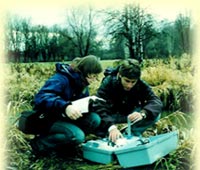Past Programs & Projects of ECOLOGIA
Since its inception in 1989, ECOLOGIA has drawn upon successful models for supporting environmental initiatives. We have also specialized in developing entirely new and innovative programs. Consequently, over more than thirty years ECOLOGIA developed regional expertise, created long-lasting partnerships, and honed the skills necessary to establish meaningful and effective projects for countries in transition. The following are past projects through which ECOLOGIA developed its commitment to and knowledge of Central and Eastern Europe, the Baltics, and the former Soviet Union, and expanded to work in China and on international standards. Part of wisdom is knowing when to step back and move on; that applies to each of the programs included here.
 American Film Debuts:
American Film Debuts:
ECOLOGIA introduced environmental films to American audiences by sponsoring several film festivals and visits of ecological filmmakers from the former Soviet Union. For example, ECOLOGIA sponsored the American premier of Georgy Sklarevsky's "Mikrofon," an award winning documentary on the 1986 Chernobyl disaster.
 Baltic Mini-Grant Program: 1993-2003
Baltic Mini-Grant Program: 1993-2003
This program provided funding for small scale community and environmental projects, developed by Estonian, Latvian and Lithuanian NGOs to address local needs. An example of one of the mini-grants projects is a park clean-up in the Daigeliai Pine Forest by the Lithuanian club "Peledziukas" (Little Owl). Students organized a clean-up of the park, replaced dead trees with saplings, fenced insect habitats, and established a water quality monitoring point on the Venta river. The project was also supported by the local municipality which provided a truck for transporting the collected garbage.
ECOLOGIA and our Baltic partners are now working through the Virtual Foundation to expand their visibility and pool of potential supporters.
 The Bridge Project: 1997-2000
The Bridge Project: 1997-2000
The Bridge Project was based at the Central European University (CEU) in Budapest, Hungary. This project worked to increase student awareness of the critical role that non-governmental organizations play in developing civil societies. Bridge Project staff developed workshops, fieldwork, and internships to complement students' traditional studies. We believe that providing greater opportunity to participate in NGO activities addresses the CEU's mission of building civil societies.
 Citizens' Environmental Water Monitoring Network:
Citizens' Environmental Water Monitoring Network:
Because environmental information was traditionally difficult to obtain in countries with a Soviet history, ECOLOGIA established the first non-governmental environmental monitoring network composed of 20 sites in Central and Eastern European, the Baltic nations, Russia, and at the Aral Sea in Uzbekistan. Past efforts to supply monitoring data or technical information to NGOs in the FSU and CEE have generally involved one-shot activities such as joint expeditions on a river to collect a set of data, or conferences to exchange information on a single specialized topic. When expeditions and conferences end, there is little residual institutional capability transferred - foreign monitoring equipment is taken back and foreign experts return home.
All participants in ECOLOGIA's monitoring network were equipped with portable laboratories, HACH spectrophotometers, and were provided with extensive technical training and on-site assistance. These labs are capable of measuring over one hundred water quality parameters (e.g. heavy metals, nitrates, phenols).
 ECOLOGIA Newsletter:
ECOLOGIA Newsletter:
ECOLOGIA's bi-monthly Newsletter reached over 1,100 readers in the United States, Central and Eastern Europe, the Baltics, and the former Soviet Union - serving more than 100 grassroots environmental groups. ECOLOGIA Newsletter analyzed issues and presented case studies of relevance to the international environmental community. For many NGOs in these regions, especially those off the beaten track, it was the only source of information they had on effective models for program and institutional development. The newsletter was published in English, Lithuanian, and Russian.
 E-TIP: 1995-2001
E-TIP: 1995-2001
There is an overwhelming amount of environmental information available online. However, this information varies in quality and is often difficult to locate. E-TIP provided a categorized and annotated listing of websites that met stringent criteria for quality. English and Russian language evaluations provided an objective review of the resources.
 FSU and Baltic Paper Recycling:
FSU and Baltic Paper Recycling:
Project P.A.P.E.R. broke new ground on NGO- initiated environmental technology transfer to create a sustainable paper recycling industry. The brokers of this clean paper making technology transfer were two environmental NGOs - ECOLOGIA in the United States and Social-Ecological Union in Russia and Estonia. This program established a unique partnership between Russian, Estonian, and American paper manufacturers, technical consultants, and Russian and Estonian officials.
 How to Organize Public Environmental Monitoring: 1999
How to Organize Public Environmental Monitoring: 1999
This book, available on-line, is about the practical experience gained through participation in the Citizens' Environmental Monitoring Network. (Available in Russian and English)
 Information Requests: 1989-2000
Information Requests: 1989-2000
ECOLOGIA operated a technical clearinghouse that provided information for NGOs in the FSU. Staff in the FSU and USA responded to regular requests for scientific, technical, legal, and citizen action oriented information. We recognize that much of the success of NGOs rests in their ability to have regular access to independent information.
 International Conferences:
International Conferences:
For a Soviet-American Earth Day in 1990, ECOLOGIA brought 15 Soviet and Baltic environmentalists to the United States for two weeks of workshops and technical training. A second international conference focusing upon the political challenges of greens in elected office was held in September of 1991, where over a dozen leaders from Central and Eastern Europe, the Baltics, and the Former Soviet Union joined 75 American participants.
 Northeastern Pennsylvania Environmental Center, 1994-1997
Northeastern Pennsylvania Environmental Center, 1994-1997
The non-profit NE PA Environmental Center sought to bridge the gap between lay persons and the scientific community by providing technical information and assistance in interpreting it. Individuals and non-profit organizations concerned with the environmental issues which affect local communities were invited to utilize the services offered by the Environmental Center. The NE PA Environmental Center also served as a model information resource center for grassroots organizations throughout the FSU, CEE, and Bal tics. The NE PA Environmental Center's services included:
| |
Access to the enormous collection of environmental information available through our on-line computer database networks and the Internet. |
| Seminars and workshops on employing new information technologies and other subjects of interest to citizens and organizations concerned about the environment. The best examples of this were our monthly workshops on using the Internet to locate environmental information, a lecture entitled "Co-existing with the White-tailed Deer," and Public Discussions on topics such as "The Environmental Implications of the "Contract with America" and "The Future of Public Participation: Will it be Streamlined or Steamrolled?" |
| Programs to highlight important environmental issues which have received little attention from the media and the mainstream environmental community. |
| Assistance with innovative projects initiated by community groups. |
 Ukrainian Student Exchange Program, 1994, 1995
Ukrainian Student Exchange Program, 1994, 1995
Over two years, ECOLOGIA managed three-month summer visits to the United States for sixty-one Ukrainian students. ECOLOGIA also contributed to summer camps for Chernobyl-affected children and their mothers and provided Geiger counters for students in Chernobyl-affected regions so that they can monitor play, picnic, and camping areas.
 Sustainable Development in Nuclear Regions 1998-2003 Sustainable Development in Nuclear Regions 1998-2003
Connecting 'nuclear communities' with planning tools for a more sustainable future
ECOLOGIA works with citizens and governmental bodies in Russia and Lithuania seeking to reduce their dependence on nuclear weapons production and nuclear power plants. ECOLOGIA provides global resources which enable communities to design and implement sustainable development plans. This reduces environmental degradation and the threat of nuclear accidents and weapons proliferation.
Local staff members in each country use a culturally sensitive approach to environmental problem solving. ECOLOGIA combines this local knowledge with its broad expertise and perspectives as an international organization. ECOLOGIA uses the Local Agenda 21 process, which was originally designed as part of the Rio Earth Summit of 1992. This framework for decision-making provides for input from a variety of people and organizations, including different levels of government, business and professional groups, and public interest groups.
ECOLOGIA also works on sustainable development on the international level; a delegation of international staff attended the World Summit on Sustainable Development in Johannesburg, South Africa in 2002.
 Vermont and the World Vermont and the World
Making professional and personal connections across cultures
International Exchanges:
ECOLOGIA designs and hosts a variety of environmental and human services exchange programs. Visitors to the United States build connections to like-minded Americans working in their field, as they meet with specialists who provide in-depth training and partnership possibilities. Visitors enrich the American communities they encounter by sharing their knowledge and perspectives. ECOLOGIA has worked with over 350 individuals from such countries as Russia, China, Ukraine, Czech Republic, Poland, Estonia, Lithuania, Uzbekistan, Kazakhstan, Kyrgyzstan, Turkmenistan and Tajikistan.
Service Learning:
Through cooperation with academic institutions such as Middlebury College, the Monterey Institute for International Studies, and the MESPOM (Masters of Environmental Sciences Policy and Management) program of the European Commission's Erasmus Mundus consortium of universities. ECOLOGIA has contributed to the creation of innovative globally-focused service learning opportunities on the undergraduate and graduate levels.
Organic and Local
Agriculture:
Ecologically sound agriculture is one of the keys to sustainable development; a high quality food supply requires attention to renewable resources, knowledge of the ecosystem, and public awareness of the significance of healthy food choices.
The United Nations Food and Agriculture Organization supports these efforts in developing countries. Randy Kritkausky participated in an FAO international mission to promote organic agriculture in Lithuania, in 2006.
 The Virtual Foundation The Virtual Foundation
Building global civil society by conecting donors to community projects worldwide
Note that The Virtual Foundation is still a viable entity, and ECOLOGIA provides fiduciary agent services through it. However, the global scope had to contract because most of our on-the-ground partner organizations succumbed to funding cut-backs from outside supporters and/or authoritarian pressures from within their own societies, after about 2010.
ECOLOGIA's online philanthropy program supported environmental, human health, and sustainable development projects designed by grassroots groups from around the world. The emphasis is on small scale and affordable (under $2000) projects. Donors from any nation can visit the website, (www.virtualfoundation.org) and select projects to fund.
 ECOLOGIA Consulting Services ECOLOGIA Consulting Services
Partnering with the Private Sector for Responsible and Sustainable Development
ECOLOGIA provided fee-for-service consulting to businesses, government agencies, and communities seeking to:
-
develop strategic plans capturing opportunities in emerging trends in the fields of sustainable development and corporate social responsibility;
- implement environmentally and socially responsible business practices;
- train personnel in the innovative, creative and appropriate use of management systems in order to gain economic as well as environmental and social benefits (the "triple bottom line");
- develop value added businesses and brand names (corporate or regional) that allow those who do good to also do well economically;
- develop constructive public participation programs for industrial facilities and communities making major transitions involving labor force and social dislocation.
 Sustainable Development in China Sustainable Development in China
From 1996 to 2015, ECOLOGIA worked with a broad range of Chinese partners, ranging from environmental groups, to private businesses producing for the national and international markets, to government-affiliated organizations. Our objective was to provide international linkages and appropriate support so that the Chinese people could more effectively contribute to the solution of social, economic and environmental problems, both within China and on a global scale. ECOLOGIA received foundation grants for its work with Chinese not-for-profit organizations. In addition, ECOLOGIA provided consulting services to Chinese and international businesses seeking to implement innovative and culturally appropriate corporate social responsibility programs in China.
|



